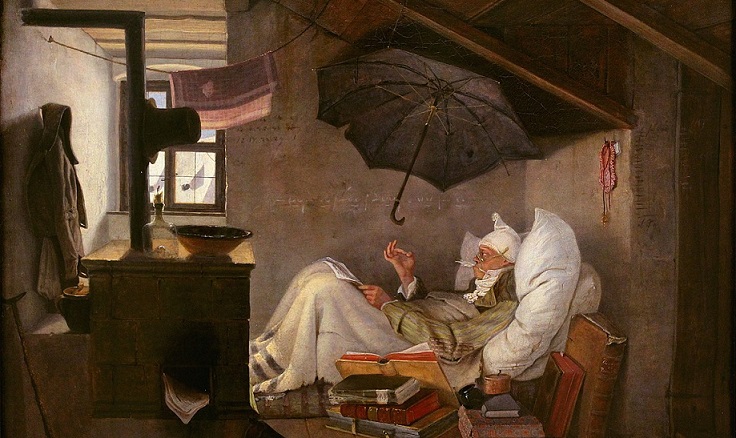In garret lofts poor artists have quite often
painted women bathing, combing hair
inside a nearby mirror…
__________________________Your eyes soften,
and, pale as blossoms or flesh from a pear,
your skin glints in the light. Snow falls outside
amid the greyness and the winter cold,
yet this one moment it is warm inside.
Crouched in the slipper tub, you sit and hold
your sprawling hair in your right hand, and comb
it with your left. You smile, sing to yourself,
and in the glass see pennies on the shelf,
a garret-loft too bare to be your home.
And I see what those starving artists see
and try to catch it for eternity.
Leo Yankevich’s latest books are The Last Silesian (The Mandrake Press, 2005) Tikkun Olam & Other Poems (Second Expanded Edition), (Counter-Currents Publishing, 2012), Journey Late at Night: Poems & Translations (Counter-Currents Publishing, 2013) & The Hypocrisies of Heaven: Poems New & Old (Counter-Currents Publishing, 2016). More of his work can be found at Leo Yankevich.com.
















This poem captures such a tender and intimate moment, and it is beautifully written. It would read well even as prose, yet Mr. Yankevich has somehow managed to fit it into this sonnet. I love the break in the middle of line 3, and the pair of rhymes that are broken up by the stanza division (one could write an essay on those two features alone).
I’ve read many so-called sonnets lately that don’t resemble a sonnet at all. This, on the other hand, is a very interesting variation on the sonnet form, yet indisputably remains a sonnet (complete with a Shakespearean couplet at the end). Anyway, this is great work. I read this one over and over.
This is so very beautiful!
It transports you in time and leaves you feeling the warmth of the room and seeing what those starving artists see.
Once again Leo, Bravo!!! Standing Ovation!!!
Dear Leo,
In this poem you have caught the push and pull of so many things in their relationship to each other. The frigid winter to the interi9or; (probably not very warm — the moment, filled with expansive warmth; the woman and the painter’s eyes — she focus on her hair and he on her skin -– truly, the interwoven relationships of outside to inside, subject and painter, and made of the whole of it a work of art in the totally different language of the scribe, recording a moment out of time, deserving of both preservation and recognition.
Bravo, Leo, for having the desire, skills and sensitivity to record this.
Sally
Amen to all the above, and for all the reasons expressed.
Note also that Leo Yankevich puts his volta at the end of line 7 (counting as a single line his stepped break in the third line). By so doing he places the volta in the midst of the second ABAB quatrain. This allows the narrative flow of the poem to not be held in check by the sonnet form itself.
Many English sonnets follow the three-quatrain-final-couplet structure closely, and while there is nothing wrong with that, it can become mechanical and rigid. Here Yankevich commands the form–the form doesn’t command him.
Once again Leo Yankevich proves himself to be one of the most accomplished formalist poets writing today.
Insightful and informative criticism – thank you for pointing it out.
If this were an ekphrastic poem, I would love to see the original painting, if only to regard the sensuality portrayed in the poem itself. As it stands, the poem is a convoluted reflection on Art simpliciter and the relationship between the artist’s subject and the viewer/reader. In this case, Yankevich is the very artist, and it’s hard to imagine a painter who could render the scene more accurately.
Beautiful poetry, with reflective sensitivity. Thank you.
The most difficult thing in any art is to present a complicated, multi-layered idea with simplicity/ Count Leo has accomplished this feat with grace,
This sonnet brings to life a tender scene and bathes us in sensory detail, as if we are actually present. Very well written!
Forgive me for being remiss in thanking you all for your kind and generous comments.
This is a fabulous poem, so technically accomplished and fluent, very beautiful. Two small points that I would like to add to the narrative about it. One, the use of the feminine rhymes, often/soften; feminine rhymes are difficult to use in these kind of poems because they easily lend themselves to comic effect. But here they glide effortlessly with the beguiling sense of the poem. And second, that beguiling sense is almost Christmassy with the snow and cold outside, but this luxurious being inside, and beauty of observation – the artist’s observation of her – piling up sensuously. But what does she observe? ‘pennies on the shelf’ and a place too bare to be her home; a most deliberate, almost brutal calculation in the mystery of this creative act. So much implied by so few words – great poetry.